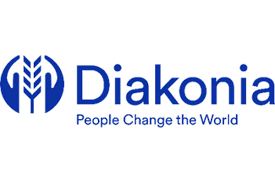Location
SE-167 14 Bromma
SWEDEN
Diakonia is an international development organization with Christian values that works together with local partner organizations for sustainable change for the most vulnerable people in the world.
Diakonia is a faith-based Swedish development organization. We support and work with around 350 local partner organizations in 25 countries. Together with our partner organizations, we form a global network that works to ensure that more people are able to live dignified lives.
Members:
Resources
Displaying 1 - 5 of 23Evaluation Cadaster 1998 - 2014 - Evaluation of National Land Su
General
The evaluations purpose is to identify, and illustrate with evidence, the medium- and long-term results and lessons achieved by the land administration projects as compared to the project's objectives. Emphasis should be on lessons learned in order to carry out any future contribution.
Evaluation Cadaster 1998
General
The evaluations purpose is to identify, and illustrate with evidence, the medium- and long-term results and lessons achieved by the land administration projects as compared to the project's objectives. Emphasis should be on lessons learned in order to carry out any future contribution.
Land Management and Urban Development - Improving land management and urban development
General
The project aims to create conditions for sustainable innovative development in Belarus through improved land management and urban development.
Objectives
- The project «Improving land management and urban development in the Republic of Belarus, using contemporary methods and technologies» was implemented during the activity period Sep. 2016 – Dec. 2019. - The objectives were to: --- strengthen the potential of CSO «OO “Land Reform”» in the fields of land administration, urban planning and community initiatives, as well as that of other CSOs --- contribute to spatial planning democratisation with regard to inclusion of population in the local planning process --- enhance the cadastral valuation system for purpose of real property taxation and tax control within the real property sector --- implementation an operational plan for gender analysis
Swedwatch 2020-2023 - Swedwatch ISK-revision 2023 (GLOBEC)
General
Despite a clear trend toward sustainability within the private and public sector, many challenges remain with regards to production, land rights, labor rights and environmental pollution and climate. Swedwatch is an organisation which through research and multistake-holder dialogue works for a normative change within business to reduce its negative consequences and to align it better with social, economic and environmental goals. Through a core support of 53,9 MSEK Sida is supporting Swedwatch's work for sustainable business and its contribution to the normative discussions on a global level. Through its sector-specific and thematic research, Swedwatch seeks to contribute to 1. Responsible and equitable management and use of natural resources 2. Sustainable and fair global supply chains: global supply chains for production of goods and services are increasingly sustainable, fair and transparent 3. Empowered rights holders and expanded civic space: civil society within the area of business, human rights and environment is increasingly informed and active In order to do this, Swedwatch has a clear emphasis on rights-holders where they cooperate with local groups and indigenous people in order to make their voices heard. Swedwatch also engages in dialogue with corporations to influence them and to jointly create positive examples of sustainable business, for example by encouraging human rights due diligence. Swedwatch works for public procurement to increasingly emphasize issues of sustainability. Swedwatch use their research to influence and challenge business in a variety of networks, such as the United Nations Economic and Social Council, the EU and OECD.
Objectives
Swedwatch's vision is a world in which economic systems are just, transparent and sustainable. Human rights and the environment are protected and respected and businesses contribute to sustainable development and inclusive growth within the means of the planet. Swedwatch aims to contribute to the empowerment of rights holders and will promote responsible business practices that respect human rights and the environment. Through research, investigations and multi-stakeholder dialogue Swedwatch aims to contribute to behavioural changes of business actors, public actors and civil society actors in order to safeguard human rights and environmental sustainability. To this end, Swedwatch's strategy has three main objectives: 1. Responsible and equitable management and use of natural resources 2. Sustainable and fair global supply chains 3. Empowered rights holders and expanded civic space
How tree cover affects groundwater resources across African tropical drylands
General
An estimated 80% of the global population lack secure water resources. Many also lack ready access to fuel wood and other tree derived benefits. However, the current scientific paradigm says that we must choose which problem to solve as increasing tree cover always reduces water availability. Consider the costs if this thinking is wrong. In Africa, 175 M ha of degraded lands are judged suitable for tree planting which could significantly enhance people’s livelihoods. Our previous research in the seasonally dry tropics indicates that an intermediate tree cover can often improve groundwater recharge. This need testing on a larger scale, but if confirmed will upend the prevailing view in hydrology and have profound implications for policies affecting millions of livelihoods and the environment. Thus, the aim of this project is to provide evidence for better policies and management that will benefit poor people in drylands by evaluating the novel “optimum tree cover theory” for groundwater recharge across African drylands. The project involves four leading institutions; SLU, ICRAF, WU and NMBU. We will use the Land Degradation Surveillance Framework; a unique dataset that is available across Africa. It consists of multiple variables, including tree cover and key soil variables. We will do complementary strategic measurements of soil water flow and tree water use to model groundwater recharge as a function of tree cover under common conditions of the seasonally dry tropics.


